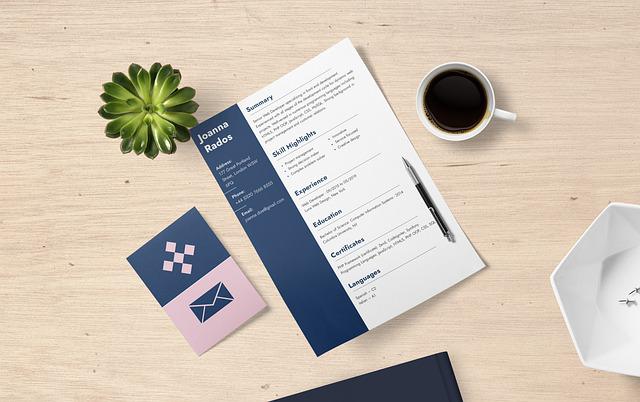Are you sending out resumes and wondering why you don’t get called for interviews? If you have the right experience and skills, chances are, the problem lies with your resume. With some jobs attracting hundreds of applicants, you only have seconds to impress recruiters and land that all-important interview. So it’s essential that your resume creates a good first impression and sells your skills and experience.
However, there are plenty of mistakes that are easy to make and spoil your chances of securing an interview. In this article, we’ll explore the five most common resume problems and how to fix them. If you find yourself spending a lot of time formatting and structuring your resume, consider using a resume builder like Jobseeker, which comes with ready-made templates to help you write your resume with ease.
Poor formatting
While your resume doesn’t need to be a piece of art, if it’s not easy to scan, chances are, your resume will end up on the reject pile. With recruiters spending little more than 7 seconds on scanning resumes, first impressions count more than ever.
Just as you would dress smartly for an interview, your resume also needs to convey your professionalism. Before meeting you, recruiters will build up a picture of you based on the appearance and contents of your resume. Therefore, it’s important to present your skills, experience and accomplishments in a way that helps recruiters get to the most relevant points as easily as possible.
This includes using clear, structured sections and bullet points to organise your Information, placing your most relevant experience first. Avoid making your resume look cluttered by including plenty of white space and using the same font sizes for headings (14-16 pt) and text (11-12pt).
Spelling mistakes and bad grammar
No matter how polished your resume looks, if it’s littered with spelling and grammar mistakes, the lack of attention to detail could go against you. Even if the person reading your resume isn’t pedantic about punctuation, a misplaced apostrophe or a comma can often make you stand out for all the wrong reasons.
Therefore, it’s worth taking the time to make sure your resume is error-free before hitting ‘Send’, whether you use a spell-checker or someone else to proofread your resume.
A good tip for checking spelling or grammar mistakes is to temporarily change the font, size and colour of the text – because the text will look distinctly different, it will force your brain to pay more attention and avoid going into autopilot mode. Just remember to restore the formatting once you’ve finished proofreading.
Not tailoring your resume
When you’re unemployed, it’s tempting to send your resume to as many employers as possible. You may have heard that it’s a numbers and the more applications you send out, the more interviews you’ll get.
Unfortunately, the opposite is true. If you apply for everything in sight, you’re n out tailoring your resume to every application, which means you’re not showing employers that you have a clear understanding of what the role entails. More importantly, you miss out on the opportunity to highlight the specific skills and experience that make you stand out from other candidates.
Simply by reading the job description carefully and picking out keywords and phrases can help you catch the recruiter’s eye. And if you don’t meet every single requirement in the job description, you can make sure that relevant skills and experience get attention by placing this information first in your resume.
Not focusing on your achievements
When writing about your work experience, it can be easy to focus on tasks and responsibilities, rather than achievements. After all, you want the hiring manager to know you’ve performed a similar role before. What’s more, not all roles have measurable KPIs.
However, to stand out in a crowded job market, you need to show that you bring value to an organisation and the best way to do this by quantifying your achievements. For example, instead of saying that you helped customers, you could write: ‘increased customer satisfaction by 25% by providing real-time support in live chat’.
If you don’t work with numbers or your achievements are hard to quantify, you can still demonstrate you made an impact by mentioning the number of customers you served, the colleagues you mentored or trained, the deadlines you met or the projects you managed, for example.
Ignoring employment gaps
Whether you took a career break or you were unemployed due unsuccessful job applications employment gaps may be a deal-break if you ignore them or try to lie about them.
While gaps in employment history are fairly common nowadays, if you’ve been out of work for months (or even years), you need to explain why. Left to their imaginations, most employers will assume that the worst.
Don’t be afraid to write about time out caring for a relative or children or completing personal projects, such as renovating your house. As long as you show employers you weren’t idle during your period of unemployment, most employers will overlook the gap. If you had to take time out due to serious illness, this is also something you shouldn’t be ashamed about mentioning as it was of out of your control.
However, don’t be tended to expand dates of employment to cover gaps or worse still, still lie about your time off. With most companies undertaking background checks before employing candidates, it’s never been easier to verify facts on a resume. At best, your resume will be rejected and you’ll miss the opportunity of an interview. At worst, you’ll risk a prison sentence as lying on a resume is a criminal offence.
Instead of wasting energy fabricating lies, take the time to demonstrate how you developed transferable skills.







Recent Comments